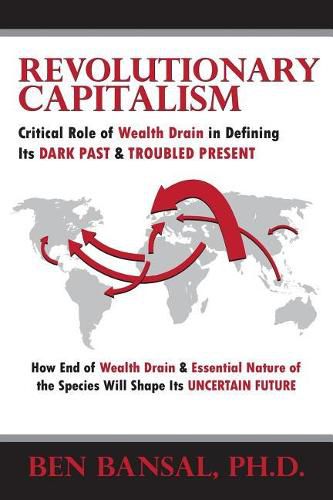Readings Newsletter
Become a Readings Member to make your shopping experience even easier.
Sign in or sign up for free!
You’re not far away from qualifying for FREE standard shipping within Australia
You’ve qualified for FREE standard shipping within Australia
The cart is loading…






This book begins by presenting an evolution of capitalism through the mercantile, industrial birth, laissez-faire, colonial, imperial, welfare, international and inequitable global stages over the last five centuries. It highlights three broad themes: -Capitalism has never existed in isolation throughout its long history of 500 years, except perhaps in the mind of its theoreticians. Capitalism has always been global. -The birth of industrial capitalism would be impossible without capital accumulation in Europe during the mercantile stage and the now-forgotten challenge posed by world’s first global industry, the incredible Indian textile industry of the 17th and 18th centuries. -The debunked theory of supply-side economics is responsible for the imbalanced global capitalism of the last 35 years. The book develops the concept of wealth drain from most to a few states that has existed throughout the history of capitalism. It carefully distinguishes systematic wealth drain from fair trade and voluntary foreign investments and assesses the magnitude and impact of wealth drain on all key players during each historical stage of capitalism. The book also outlines the future of inequitable global capitalism in the present era and concludes that it will evolve first into an equitable global capitalism. Following that, it will likely face a challenge from market socialism. The success of market socialism and possibility of genuine socialism beyond that hinge on whether the self-centered human nature that capitalism relies on and promotes can be re-configured. The book takes the position that Marxian analysis of laissez-faire capitalism remains unsurpassed. However, that does not imply a rush to dismantle the current order. Clearly, Marx ignored the role of wealth drain in real-world capitalism, may have severely overestimated the malleability of human nature and unnecessarily linked the emergence of socialism to atheism. Agnosticism would have been sufficient. There is little doubt that population centers of the world are going to converge in per capita income by mid-century, give or take a decade. There is also little doubt that the world is going to experience at least a tenfold increase in wealth production by the end of the century. The great unknowns are not the future of Islamic fundamentalism and saving the planet from fossil fuels, for they will be taken care of, but whether capitalism in its present form survives over the next century and what the role of self-conscious machines in the distant future will have in the survival of the species itself.
$9.00 standard shipping within Australia
FREE standard shipping within Australia for orders over $100.00
Express & International shipping calculated at checkout
This book begins by presenting an evolution of capitalism through the mercantile, industrial birth, laissez-faire, colonial, imperial, welfare, international and inequitable global stages over the last five centuries. It highlights three broad themes: -Capitalism has never existed in isolation throughout its long history of 500 years, except perhaps in the mind of its theoreticians. Capitalism has always been global. -The birth of industrial capitalism would be impossible without capital accumulation in Europe during the mercantile stage and the now-forgotten challenge posed by world’s first global industry, the incredible Indian textile industry of the 17th and 18th centuries. -The debunked theory of supply-side economics is responsible for the imbalanced global capitalism of the last 35 years. The book develops the concept of wealth drain from most to a few states that has existed throughout the history of capitalism. It carefully distinguishes systematic wealth drain from fair trade and voluntary foreign investments and assesses the magnitude and impact of wealth drain on all key players during each historical stage of capitalism. The book also outlines the future of inequitable global capitalism in the present era and concludes that it will evolve first into an equitable global capitalism. Following that, it will likely face a challenge from market socialism. The success of market socialism and possibility of genuine socialism beyond that hinge on whether the self-centered human nature that capitalism relies on and promotes can be re-configured. The book takes the position that Marxian analysis of laissez-faire capitalism remains unsurpassed. However, that does not imply a rush to dismantle the current order. Clearly, Marx ignored the role of wealth drain in real-world capitalism, may have severely overestimated the malleability of human nature and unnecessarily linked the emergence of socialism to atheism. Agnosticism would have been sufficient. There is little doubt that population centers of the world are going to converge in per capita income by mid-century, give or take a decade. There is also little doubt that the world is going to experience at least a tenfold increase in wealth production by the end of the century. The great unknowns are not the future of Islamic fundamentalism and saving the planet from fossil fuels, for they will be taken care of, but whether capitalism in its present form survives over the next century and what the role of self-conscious machines in the distant future will have in the survival of the species itself.